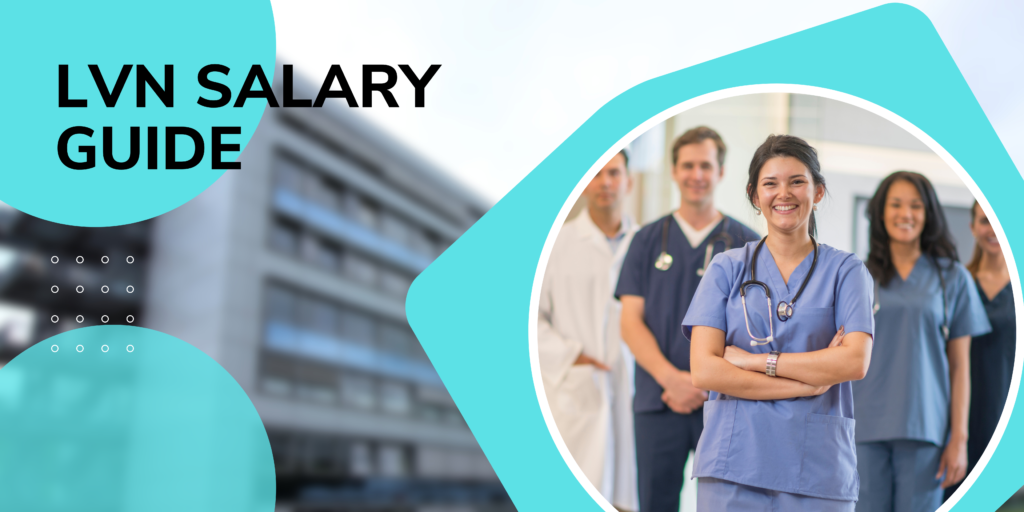From education to training, there are multiple levels to nursing. Not everyone needs to settle for an associate’s degree, nor do they have to spend a fortune for their doctorate.
Ultimately, your priorities and goals will depend on what works best for you. To help you choose, this guide covers everything you need to know about the nursing degree types and levels of education.
What are the salaries for each level of nursing?
Below are the current average salaries for each nursing level, according to Payscale’s user base.
| Speciality |
Licensed Practical Nurse (LPN)/Licensed Vocational Nurse (LVN) |
Associate’s Degree in Nursing (ADN) |
Bachelor of Science in Nursing (BSN) |
Master of Science in Nursing (MSN) |
Doctor of Nursing Practice (DNP) |
| Salary |
$58,000 |
$74,000 |
$91,000 |
$100,000 |
$109,000 |
LPN
Becoming a Licensed Practical Nurse is one of the fastest ways to become an HCP. The LPN diploma programs only take around 12 to 15 months, while an associate’s degree takes around 2 years.
LPN nursing degrees are relatively more affordable, although this is not always the case. Tuition will cost you around $10,000 to $15,000, depending on where you enroll.
LPNs primarily take on direct care roles, such as helping patients with eating, bathing, dressing and cleaning. Under the supervision of a Registered Nurse (RN) or doctor, they can take on more advanced tasks like collecting biological samples, performing CPR and administering medications.
Becoming an LPN is worth considering if you want to become an HCP as fast as possible. If you wish to pursue further education down the road, there are RN bridge programs available to you. Just keep in mind that RN graduates will outearn you, upon graduation. Catching up with them will be a lengthy and costly process.
ADN
To become a Registered Nurse, you need an Associate’s Degree in Nursing (ADN) at the bare minimum. These programs only take around two to three years to complete. This makes the program appealing to nurses who want to become RNs as quickly as possible.
However, ADN nurses are accordingly paid less than their Bachelor’s or Master’s nursing degree counterparts. They also may not be afforded the same job opportunities and options for career progression.
Registered nurses take on a number of different roles in healthcare, including (but not limited to) performing diagnostics tests, monitoring patient conditions, assisting in the development of care plans, supervising the nursing assistants and LPNs under them and providing patient education, every step of the way. Compared to LPNs, they take on a considerably greater number of responsibilities.
Tuition depends on where you enroll. Public schools can charge between $8,000 to $22,000 while private institutions can ask for up to $50,000.
BSN
Nurses with a Bachelor of Science in Nursing (BSN) have extensive four-year training programs that go over critical theoretical and practical nursing knowledge. Thanks to this, they are afforded more career opportunities compared to lower levels of nursing.
Hospitals will typically prioritize BSN RN applicants, compared to ADN ones. In addition, nurses can even qualify for administrative roles, if they want to pivot from clinical work. These nurses focus on finishing paperwork, hiring employees, developing detailed training plans and more.
Tuition is considerably higher, compared to ADN. Public schools will charge $40,000 to $80,000 and private universities could ask for $60,000 to as much as $120,000. In addition, out-of-state students usually pay considerably more.
The cost is high but the dividends are huge. Whether it is salary or professional opportunities, BSN nurses have a considerable leg up over their aforementioned counterparts.
MSN
Maybe you are looking past RN roles. If that is the case, you may want a Master of Science in Nursing (MSN).
These two-year MSN programs are the minimum requirement if you want to become an Advanced Practice Registered Nurse (APRN). APRNs like Nurse Practitioners, Nurse Anesthetists and Nurse Midwives are among the highest-paid nurses in the whole industry.
Becoming an APRN and getting your MSN nursing degree is a huge commitment. Minimum requirements include (among other things) at least a BSN and significant clinical experience. Additionally, the programs themselves are extremely expensive and difficult.
They provide specialized services that require extremely advanced education and training. Anesthesia, for instance, is a staple for many medical procedures but is dangerous without trained professionals administering it. Naturally, these professionals are paid handsomely and enjoy additional autonomy (depending on where they live.)
If you do not want to become an APRN, you can take an MSN program for non-clinical roles such as management or nurse education. These paths do not pay quite as much, but they are still well-compensated and in high demand.
DNP
Doctor of Nursing Practice is a relatively new terminal nursing degree type. Because it is not as standardized, APRNs are not strictly required to take on their doctorate.
That being said, it is still worth considering if you want to “future-proof” your credentials. Possessing a DNP also provides a sense of prestige and tenure that the MSN does not. In certain states, DNPs can even operate their own practices, which is more than can be said for most nurses.
DNP also provides specialized training for nurses looking to achieve high-level administrative and directorial roles in the future.
How much a DNP nursing degree costs depends on your path. MSN to DNP, the most traditional path, may cost you as little as $17,660 or as much as $169,510.













